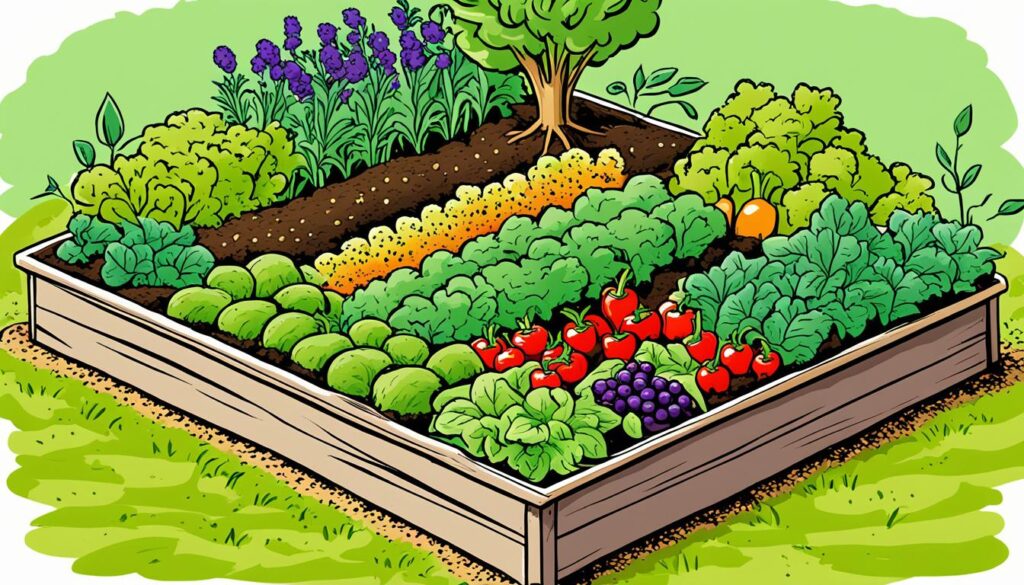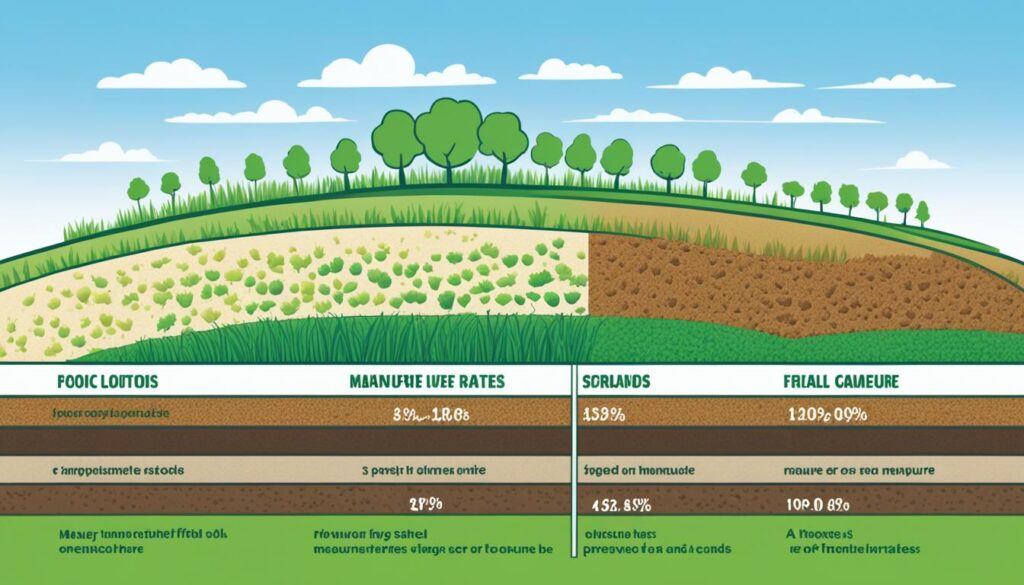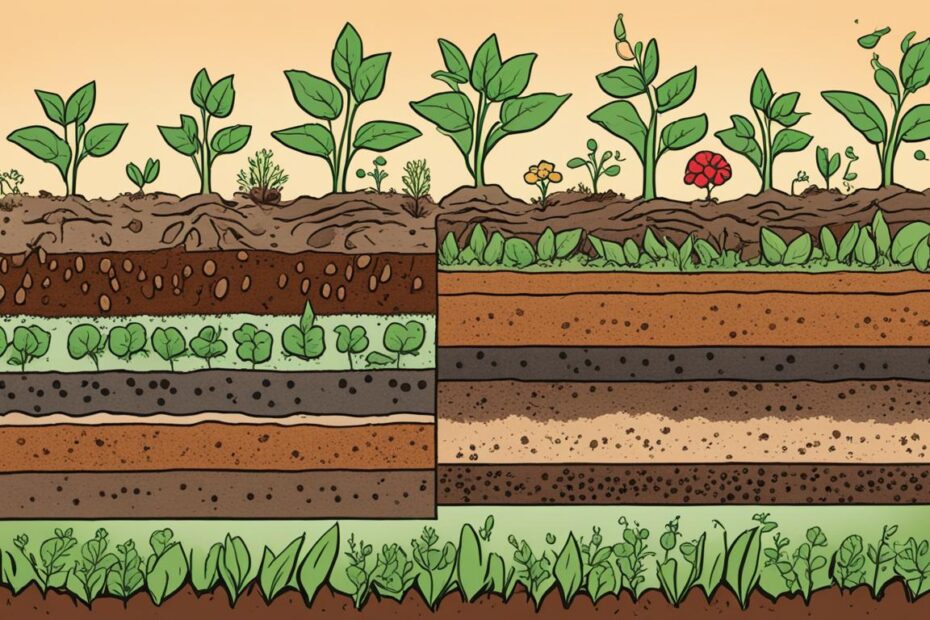Are you wondering how much manure to add to your soil for optimal enrichment? The answer may surprise you. While manure is a valuable soil amendment that provides essential nutrients for plant growth, the amount needed for maximum benefit depends on various factors. Understanding these factors is crucial to ensure efficient nutrient management and sustainable gardening practices.
Key Takeaways:
- Animal manure supplies primary nutrients and micronutrients for plant growth.
- The amount of nitrogen in manure varies depending on the type of animal and bedding materials used.
- Timing of manure application is crucial to ensure nutrient availability for plants.
- Manure may contain excess phosphorus and potassium, leading to potential buildup and environmental hazards.
- Long-term manure application can enhance soil health, increase organic matter, and improve crop productivity.
Benefits of Manure as a Soil Builder and Nutrient Source
Manure is a powerful soil amendment that offers numerous benefits to your garden. By incorporating manure into your soil, you can increase nutrient availability, improve soil structure, foster soil organisms, and enhance overall soil health.

One of the key advantages of using manure is its ability to increase the nutrients available to your plants. Manure contains a wide range of essential nutrients, including nitrogen, phosphorus, and potassium, which are vital for healthy plant growth. When manure is added to the soil, these nutrients become readily accessible to plants, promoting robust and vigorous growth.
Manure also plays a crucial role in improving water holding capacity in your soil. The organic matter present in manure helps retain moisture, reducing the risk of water runoff and allowing plants to access water for a more extended period. This water retention capability is especially beneficial during dry spells when water conservation becomes paramount.
Another significant benefit of using manure is that it promotes soil structure. Manure helps bind soil particles together, creating aggregates that improve soil porosity and aeration. This enhanced soil structure allows roots to penetrate deeper, access nutrients, and encourages healthy root development.
Furthermore, manure supports a diverse population of soil organisms such as bacteria, fungi, and earthworms. These organisms play a vital role in decomposing organic matter, breaking down nutrients, and improving soil fertility. Incorporating manure into the soil creates a favorable environment for these beneficial organisms to thrive, leading to a healthier and more robust ecosystem.
Using manure in your garden is like nurturing the very foundation of life. It provides the nutrients, structure, and biology that support your plants’ growth, making it a cornerstone of sustainable gardening.
Lastly, manure helps reduce erosion by improving soil stability. The organic matter in manure binds soil particles together, preventing them from being carried away by wind or water. This erosion control is particularly crucial in sloping areas or regions prone to heavy rainfall.
The Importance of Organic Matter
Increasing organic matter through manure or compost application is a game-changer for your soil. Organic matter serves as a source of nutrients, acts as a reservoir for water, fosters beneficial microorganisms, and improves soil structure. It provides a solid foundation for healthy plant growth and thriving gardens.
When manures high in undigested material or non-sand bedding materials are added to the soil, they break down slowly, gradually releasing organic matter and nutrients over time. This slow breakdown process ensures a sustained supply of organic matter, contributing to long-term soil health and fertility.
It’s worth noting that solid and semi-solid manures and composts are more effective as soil builders compared to liquid manures and slurries. Solid and semi-solid forms provide a higher concentration of organic matter, nutrients, and microbial activity, which contribute to better soil conditioning and improved plant performance.
Solid and Semi-Solid Manures vs. Liquid Manures
| Benefits | Solid and Semi-Solid Manures | Liquid Manures |
|---|---|---|
| Enhances soil structure | ✓ | ✗ |
| Increases nutrient availability | ✓ | ✗ |
| Fosters soil microbial communities | ✓ | ✗ |
| Reduces erosion | ✓ | ✗ |
Factors to Consider for Manure Application
When it comes to utilizing manure as a soil amendment, several key factors need to be considered to ensure optimal results. These factors include the nutrient content of the manure, conducting a soil test, proper manure timing, nitrogen availability, phosphorus buildup, and ensuring food safety.
Nutrient Content
The nutrient content of manure can vary significantly depending on factors such as the type of animal, feeding program, bedding materials, manure age, and water content. To accurately determine the nutrient content of the manure, it is essential to conduct a nutrient analysis. This analysis provides valuable information about the available nutrients, allowing you to tailor your application rates accordingly.
Soil Test
Before applying manure to your soil, it is highly recommended to conduct a soil test. A soil test provides crucial information about the nutrient levels and pH of your soil. By understanding your soil’s specific needs, you can make informed decisions about manure application rates and supplemental fertilizer requirements.
Manure Timing
The timing of manure application plays a critical role in nutrient availability for plants. Not all nutrients, especially nitrogen, are immediately accessible upon manure application. Approximately 50% of the nitrogen in manure becomes available during the first year if incorporated into the soil, while only 30% may be accessible if left on the soil surface. Proper timing ensures that plants receive the necessary nutrients at the right stage of growth.
Nitrogen Availability
Nitrogen is a vital nutrient for plant growth, and the availability of nitrogen in manure can vary depending on the application method. Incorporating manure into the soil allows for better nitrogen retention and utilization by plants, whereas surface application may result in higher nitrogen losses through volatilization or leaching. Careful consideration of nitrogen availability is crucial to avoid nutrient deficiencies or excesses.
Phosphorus Buildup
Manure often contains higher levels of phosphorus and potassium than crops require. Ongoing and excessive manure application can lead to phosphorus buildup in the soil, increasing the risk of nutrient runoff and water contamination. Understanding the phosphorus needs of your crops and implementing appropriate management practices can help prevent excessive buildup and minimize environmental hazards.
Food Safety
Raw manure presents potential health risks for crops intended for human consumption. It is essential to implement precautions to prevent contamination and minimize the transmission of pathogens from manure to food. This can be achieved by adopting proper manure handling and application practices, complying with food safety guidelines, and utilizing well-composted or properly aged manure for vegetable production.
By carefully considering these factors related to manure application, you can maximize its benefits while minimizing potential risks. Managing nutrient content, conducting soil tests, optimizing timing, ensuring nitrogen availability, preventing phosphorus buildup, and prioritizing food safety are all critical components of utilizing manure effectively in your gardening practices.
Calculating Manure Application Rates
When it comes to enriching your soil with manure, determining the correct application rates is crucial. The amount of manure you should apply depends on several factors, including the nutrient needs of your crops, results from soil testing, and the nutrient content of the manure itself. To ensure accurate nutrient content, it’s recommended to test your manure or compost.
One of the benefits of using manure as a soil amendment is the increased nitrogen mineralization and nitrification it provides. This improves soil fertility and promotes healthier plant growth. In fact, manured plots have been found to have higher concentrations of nitrate-nitrogen and lower concentrations of ammonium-nitrogen compared to non-manured plots.
However, it’s important to consider the impact of long-term manure application on phosphorus fractions. While manure can significantly increase all measured phosphorus fractions, it may also lead to an increased risk of phosphorus losses via leaching. This highlights the importance of optimizing the use of both manure and inorganic fertilizer nutrients to ensure sustainable and reliable crop yields.
Here is an example of how manure application rates can vary based on nutrient needs and soil test results:
| Crop | Nutrient Needs | Soil Test Results | Manure Application Rate |
|---|---|---|---|
| Corn | High Nitrogen, Medium Phosphorus | Low Nitrogen, High Phosphorus | 4 tons/acre |
| Tomatoes | Medium Nitrogen, High Phosphorus | Medium Nitrogen, Medium Phosphorus | 2 tons/acre |
| Lettuce | Low Nitrogen, Low Phosphorus | Low Nitrogen, Low Phosphorus | 1 ton/acre |
Remember, the exact application rates may vary depending on specific factors, such as the nutrient content of your manure. Conducting regular soil tests and adjusting the application rates accordingly will help you optimize the use of manure and ensure healthy crop growth.
Quote:
“Determining the appropriate manure application rates is a balancing act between meeting crop nutrient requirements and minimizing potential environmental concerns.” – Dr. Jane Smith, Soil Scientist.
By calculating the right manure application rates and combining it with the benefits of nitrogen mineralization and phosphorus optimization, you can achieve sustainable and nutrient-rich soil for your crops.

Impact of Manure on Soil Health and Crop Productivity
Long-term manure application can have a significant impact on soil health and crop productivity. When manure is used as a soil amendment, it can contribute to the increase in soil organic matter, soil organic carbon, water-extractable organic carbon, active carbon, and plant-available water content.
One of the key benefits of manure application is its ability to enhance soil enzyme activity, which is an indicator of improved soil health. This increased enzyme activity promotes nutrient cycling and availability, leading to improved plant growth and yield stability.
A notable example is the Knorr-Holden plot, where manure has been applied for over 77 years. In this plot, the soil organic matter, carbon, and nitrogen have significantly increased compared to non-manured plots. This demonstrates the long-term positive impact of manure application on soil health and nutrient availability.
Furthermore, manure application has been found to improve yield stability and reliability in corn production. The addition of manure increases organic matter content, essential nutrients, and water holding capacity, creating a favorable environment for plant growth. The enhanced soil enzyme activity resulting from manure application further supports optimal nutrient uptake by crops, leading to more stable and reliable yields.
It is important to note that while manure offers numerous benefits, optimizing the use of both manure and inorganic fertilizer nutrients is key to achieving sustainable and reliable crop yields. This balanced approach ensures that nutrient availability is maximized while minimizing the risk of nutrient imbalances or environmental concerns.
To summarize, the impact of manure on soil health and crop productivity is significant. Long-term manure application increases soil organic matter, enhances soil enzyme activity, and improves nutrient availability. This, in turn, leads to improved yield stability and reliability. By utilizing manure in conjunction with other nutrient sources, gardeners can enhance the health and productivity of their crops, promoting sustainable and enriched soil for optimal plant growth.
Conclusion
Manure application is an essential practice for enriching the soil and managing nutrients in sustainable gardening. By incorporating manure into your home garden, you can provide plants with the primary nutrients and micronutrients they need for healthy growth. Additionally, manure improves soil structure, enhancing its water-holding capacity and supporting the growth of beneficial soil organisms.
When applying manure, it is crucial to consider factors such as nutrient needs, soil test results, and the nutrient content of the manure. This ensures that you apply the right amount of manure to avoid nutrient buildup, food safety risks, and environmental contamination. Regular and long-term manure application can lead to enhanced soil health, increased organic matter content, and improved crop productivity.
To achieve sustainable gardening practices, it is important to optimize the use of both manure and inorganic fertilizer nutrients. By striking the right balance between these two nutrient sources, you can create a rich and fertile soil environment that supports the growth of thriving plants. With proper manure application and nutrient management, you can achieve sustainable gardening practices and enjoy the rewards of a bountiful and vibrant garden.
FAQ
How much manure should I add to my soil?
The amount of manure to add to your soil depends on several factors, including the nutrient needs of your crops, soil test results, and the nutrient content of the manure. It is important to test the manure for accurate nutrient content before applying it to your soil.
What are the benefits of using manure as a soil builder and nutrient source?
Manure is a valuable soil amendment that increases nutrients available to plants, improves water holding capacity, promotes soil structure, supports soil microbial communities, and reduces erosion. It also increases organic matter, which improves soil health and productivity.
What factors should I consider for manure application?
When applying manure, it is important to consider the nutrient content of the manure, soil test results, and the timing of application. Additionally, the availability of nitrogen in manure varies depending on whether it is incorporated into the soil or left on the surface. There is also a potential risk of phosphorus buildup and food safety concerns with raw manure.
How do I calculate manure application rates?
Calculating manure application rates involves considering the nutrient needs of your crops, soil test results, and the nutrient content of the manure. Manure or compost should be tested for accurate nutrient content. Additionally, manure application can increase nitrogen mineralization and phosphorus fractions in the soil.
What impact does manure have on soil health and crop productivity?
Long-term manure application can increase soil organic matter, improve water holding capacity, enhance soil enzyme activity, and contribute to higher concentrations of nitrate-nitrogen. This leads to improved soil health, yield stability, and nutrient availability for crops.
How does manure application benefit sustainable gardening?
Manure application is a valuable practice for enriching soil, managing nutrients, and promoting sustainable gardening. By optimizing the use of both manure and inorganic fertilizer nutrients, gardeners can achieve long-term soil enrichment and improved crop productivity.
